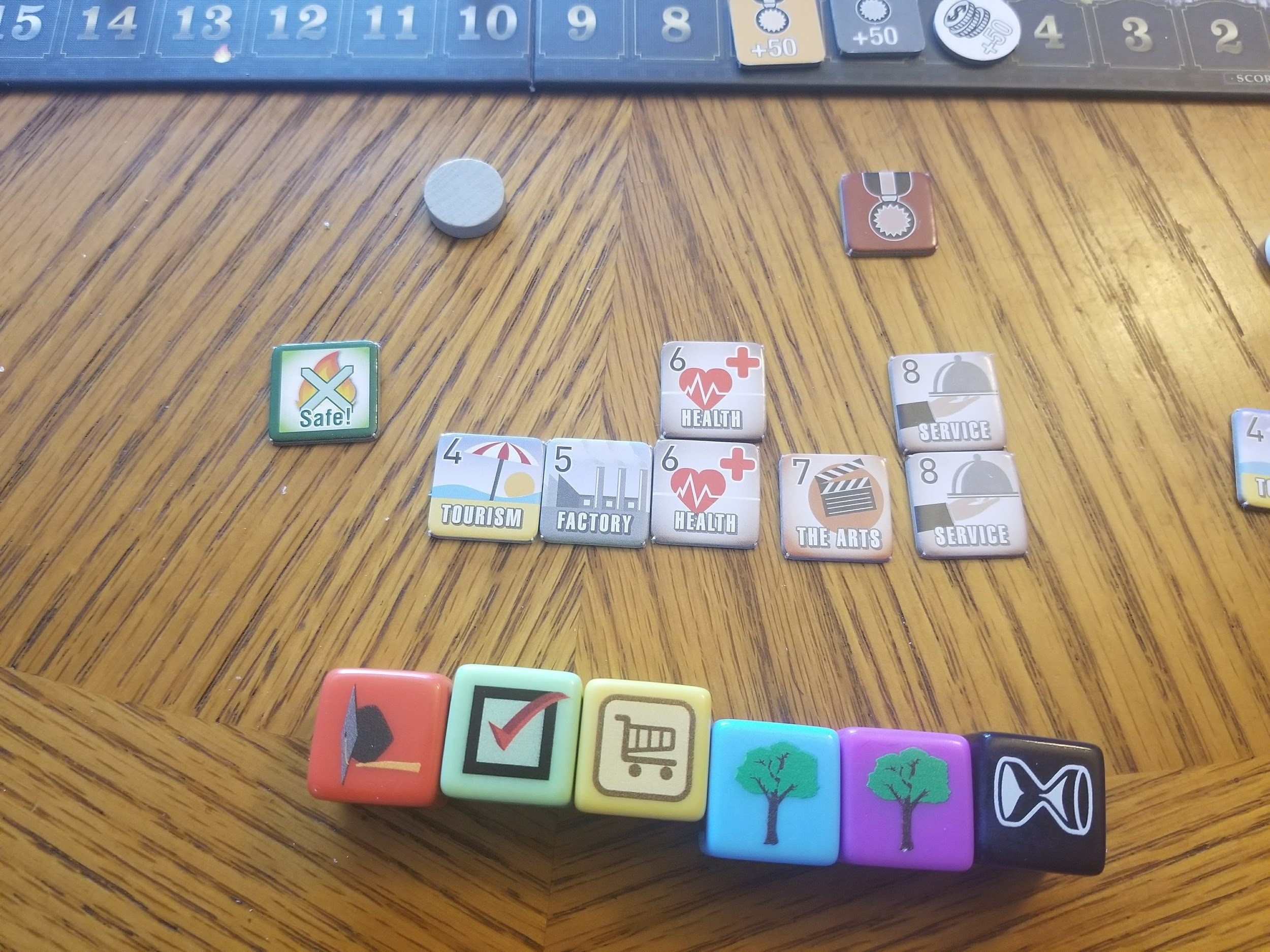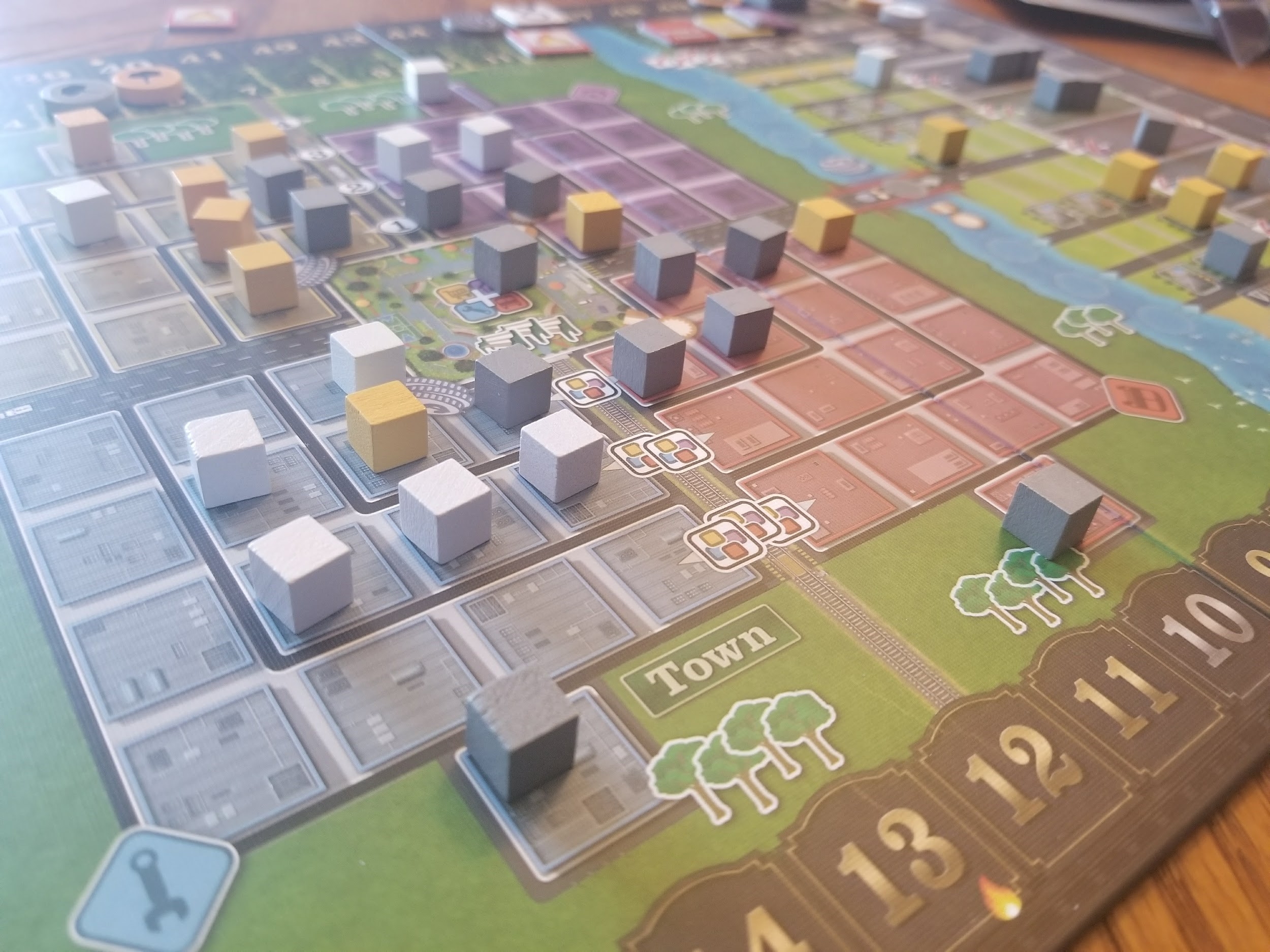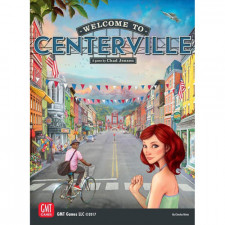Welcome to Centerville Review
on Feb 21, 2018
Critical Hits: Enjoyable dice system, solid presentation.
Critical Misses: Dry scoring, thin theme.
Roll your dice. Save the ones you want. Reroll the rest. Do this three times.
Sound familiar? If you’ve played a dice game or two in the past decade, you’ve encountered this formula ad nauseum. It’s not a bad formula though; there are worse ones you could copy. And Welcome to Centerville by Chad Jensen and GMT games does an admirable job, utilizing the mechanism to good effect. There are always lots of options, no matter what you roll, and even a bad roll can end up netting you something. Roll a lot of something you don’t need and then face the difficult choice of rolling with it or else re-rolling to try to get the category you’re really weak in.
You know the drill, and Centerville does this little jig with this best of them.

The gray player is collecting occupations like they’re going out of style.
It’s not the dice, then, that drag Centerville down into the slums. Games should be more than a scoring spreadsheet, and this is where Centerville falters. While building your little territories by placing cubes in the various neighborhoods of this Anytown, USA is enjoyable, the facade crumbles before long and we’re just optimizing points in various categories. We’re balancing category A against category B against category C, and whoever balances the best wins the day. King of Tokyo is shallower than Centerville, and yet it engages us because we’re rolling damage against our buddies to kick that confounded gorilla out of the city once again. Centerville makes no effort to draw you into its world with each roll of the die.
That’s not to say these decisions aren’t interesting. Trying to juggle your status, ecology, developments, political offices, lucrative river properties, occupations, and probably three or four I’m forgetting is a challenge that has its charms. Each of these areas will net you prestige or gold, and the lower of these two is your final score. It’s solid and well-balanced. It scratches the right itches and pushes the right buttons for this kind of game. But just check out all those scoring boxes I listed above: trying to score in each of these and keep them straight for three scoring rounds in a row simply becomes tedious rather than fun.
Compounding the problem is that I’m not sure whose shoes I’m supposed to be filling in this city building narrative. I’m running for office and building houses and helping the ecology and… taking… occupation… tiles? Or something? The setting and theme just don’t connect the way they do in my favorite city building games. Sure, you’re usually cast as some omnipotent city building official, the equivalent of which doesn’t exist in a free society, but here I’m not even sure what the little scoring chits, counters, and cubes even represent most of the time.

Cubes with all the variety of a cookie-cutter housing development
In Centerville’s favor, Jensen wrote a clear set of rules and an even better player aid. Once you peruse the book once you won’t have to return to it. You won’t be playing this game with your nose in the book looking up every exception, even though the game has a fair number of them. It plays a lot more smoothly than it should thanks to the excellent rulebook and clear graphical presentation. The way the pieces interact makes sense, and there’s no confusion as to how all the cogs come together to score you points, though you’ll have to see a scoring round or two before you’ll have any solid grasp of a workable strategy.
All this means I want to like Centerville. It tries to be charming, and GMT pulled out all the stops to make this an attractive mass market game. Its core design not broken or imbalanced or off-kilter in any way. If you like games where you’re just juggling scoring opportunities, you might even enjoy this one. For me, its inability to ever connect its theme to its setting and rise above a simple scoring matrix means it is a few blocks short of a city.

 Customer Support
Customer Support  Subscribe
Subscribe 




 Account
Account  Wishlist
Wishlist 

